While there is no one-stop shop for fitness and well-being, public parks come close, offering a place to nurture both.
In a new report released Wednesday, the Trust for Public Land shared ways health supporters and policymakers can boost park use by promoting the health benefits of nature and green spaces. “The Power of Parks to Promote Health” provides evidence on how parks nurture physical activity, social interactions and improve mental health.
“If we had a medicine that delivered as many benefits as parks, we would all be taking it,” APHA member Howard Frumkin, MD, DrPH, MPH, a senior vice president at Trust for Public Land, said in the report. “Parks deliver cardiovascular benefits, fight loneliness, combat osteoporosis, counter stress and anxiety, and more. And they do those things without adverse side effects and at minimal cost.”
A 2018 analysis from the trust found that residents within a 10-minute walk of parks were in better physical health and have less stress than people living farther away.
Community leaders are using a range of features to attract and engage visitors, balancing walking loops, courts for sporting events and climbing boulders with natural areas for quiet and contemplation. They are also offering social opportunities such as community gardening, tree planting, yoga and dance sessions, and play installations for kids.
In St. Paul, Minnesota, officials tapped into funding from the American Rescue Plan to enable the city to waive all sports league fees at its parks for at least three years. Participation increased by 100%.
Parks can be community areas for gathering, breaking down barriers among people from different socioeconomic and cultural backgrounds, the report said.
“There is a lot of evidence that the presence of green space in neighborhoods fosters community cohesion, allowing for people to know their neighbors, and promotes safety,” Georges Benjamin, MD, APHA executive director and a report contributor, said in the report.
The Trust for Public Land is working with U.S. cities and communities to help improve park access with its 10-Minute Walk program, through which leaders pledge to improve park equity. Over 300 leaders have signed up so far.
Trust for Public Land also recently ranked 100 U.S. cities for park access, using its ParkScore system. The top five cities were Washington, D.C.; St. Paul, Minnesota; Minneapolis, Minnesota; Irvine, California; and Arlington, Virginia.
An aerial shot of a London park in 2020. (Photo by Luiza Giannelli, courtesy Unsplash)